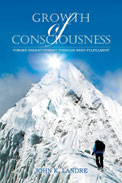
 |
Dating back to John Locke's An Essay Concerning Human Understanding, the concept of consciousness has been examined and analyzed from nearly every angle. In Landre's work, readers experience a synthesis of these ideas, packaged in an efficient and succinct structure that focuses on four phases of consciousness and the sixty-four needs that span the spectrum of self-preservation to egolessness. At the center of this work is an emphasis on understanding, an awakening that revolves around motivation and learning as the catalyst for happiness.
In a twenty-first-century society where terms like "woke" are fixtures in social justice advocacy, Landre's work delves into a spiritual awakening that transitions readers through five phases of consciousness that culminates with a zen-like extinction of all desires and ultimately enlightenment. With each stage, the author does an exemplary job of breaking down what constitutes placement as well as examples for each phase and whether it is driven by instinct, feeling, emotion, or rationale. Familiar in name but elusive in practice, self-esteem does not develop until the third, rational phase. Whether it is called moksha, as in Hinduism, or satori in Japanese Buddhism, enlightenment is predicated upon understanding a fusion of needs: physical, social, ego, and wisdom. He who can understand is then equipped with the tools to remove these needs and achieve liberation and true enlightenment.
The influence of Eastern cultures and their ancient means of communication, particularly Hinduism, Vedic knowledge, and Sanskrit, are evidenced by references to "jnana yoga" or the yoga practice for those in search of wisdom. The dichotomy between nature, or prakriti, and purusha, which is Sanskrit for both transcendent and the self, adds another dimension to the overall journey to consciousness. Despite the content being understandably complex, Landre is committed to simplifying understanding with an assortment of charts and tables that cater to readers that absorb information through the written word as well as through visuals.
Perhaps the most intriguing element of Landre's effort is the relatability factor. The author goes to great lengths to ensure that he has presented situations and circumstances that will surely apply to each individual in some capacity. For instance, having control is an abstract idea and is often oversimplified to mean that those who have wealth control their lives while those living in poverty do not. The feeling of being controlled by "autonomous, outside powers" is precisely the categorization of the first instinctual phase. Often, the integration of an ultimate outside power—the "God image," as Landre coins it—provides solace and comfort to those feeling a lack of control.
The second phase accentuates this notion of one's identity being shaped and scrutinized by outside influences and what people can contribute to the community as their source of validation and belonging. Citing Jung, Landre gives the example of how nearly every individual responds to "who are you" with their professional pedigree because, in their eyes, that is what defines them. As the individual progresses from one level of consciousness to the next, he begins to recognize the presence of God in many forms (e.g., unconscious, inner spirit, inner guide, etc.). Landre's knack for helping audiences break down their journeys into these smaller, more digestible pieces is commendable.
The comprehensive nature of the text and the dissection of the dozens of needs as a whole offers an illuminating experience. For some, the work will provide introspection into what they genuinely enjoy (or don't). Meanwhile, others will gain a more fluid understanding of their family systems, confidence, duty, approval, and much more. Landre's book is a meaningful and thought-provoking must-read.
RECOMMENDED by the US Review